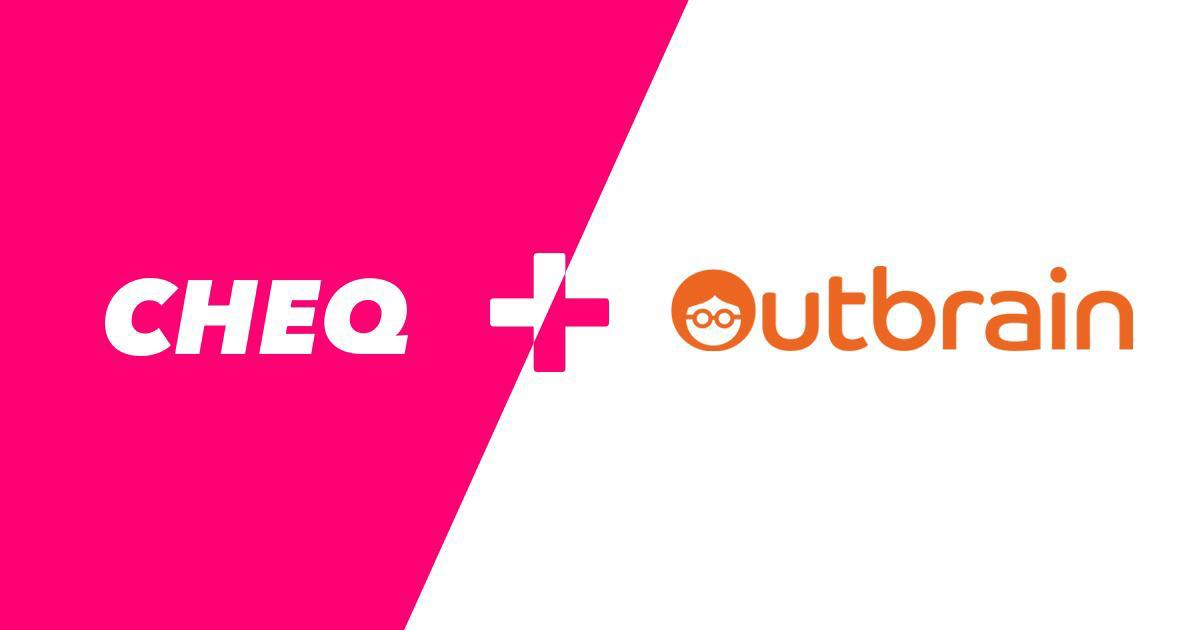Outbrain, the world’s leading discovery and native advertising platform on the open web, recently selected CHEQ‘s cybersecurity-backed offering to secure its digital media from non-human, invalid and fraudulent traffic. This additional layer of ad-fraud protection now sits on top of Outbrain’s existing, rigorous defenses.
“Ad fraud is a consistent problem plaguing the digital advertising industry,” said Yossi Amara, Chief Information Officer at Outbrain. “By partnering with CHEQ, we are taking the necessary steps to ensure our network is safe and secure for all clients and partners, via advanced fraud detection. This partnership will also enable the prevention of fraud traffic from flowing through our system.”
We sat down with Guy Tytunovich, CEO of CHEQ, to discuss how the company is helping to protect Outbrain’s discovery feed across the open web, to ensure that one-third of the internet-connected population can safely and securely discover the content they love.
Please tell us the crux of your partnership with Outbrain. How would it jointly help your customers?
Outbrain reaches one-third of the internet-connected population via its leading open-web content discovery feed. This is a tremendous volume of traffic which requires best-in-class protection from the growing threats of ad fraud and invalid traffic. While Outbrain deploys its own highly meticulous safeguards, adding CHEQ as an additional layer of security will help deal with growing sophisticated threats while ensuring Outbrain clients enjoy the most cutting edge ad fraud prevention technology available in the market.
Could you tell us the relation between cybersecurity and online media? What role does cybersecurity residence play in safeguarding content and traffic metrics?
Until just a few years ago, the safeguarding of content and traffic was performed exclusively by Ad Verification vendors, which are essentially AdTech companies with technology designed to track and monitor clicks, conversions and impressions, perform attribution and other ad-performance related tasks.
The problem is, these have little to do with cybersecurity-related tasks like bot mitigation, which are required for effective ad fraud and click fraud prevention.
A recent study by the University of Baltimore on Click Fraud showed that 14% of all ad clicks are invalid. That’s $24 Billion worth of ad spend wasted, and that’s just in the PPC space.
At this scale, adtech won’t do anymore. When CHEQ entered the space, it became the first cybersecurity company to offer a solution in the ad verification market. So it’s fair to say that cybersecurity is new to the online media world, but is quickly becoming the security standard for policing and safeguarding traffic and content.
Ad sales have registered significant growth in the last 2 quarters. How do you think these cybersecurity frameworks would protect advertising benchmarks, especially in programmatic ecosystems?
Advertisers are constantly optimizing for better ROAS, lower CPA’s and other metrics which impact their bottom line. What cybersecurity brings to the table is far greater accuracy in monitoring and blocking bad traffic. This of course directly impacts an advertiser’s bottom line, as inaccurate blocking not only misses a great deal of invalid traffic, it also tends to over block real human users and paying customers.
Advertisers adopting cybersecurity level protection for their campaigns are benefiting directly and feeling the positive effect on their bottom line. This has been such a meaningful move, that cyber-driven ad-security will soon be an integral part of every CMO’s toolkit.
How much has ad fraud technology evolved in the last 2 years? What kind of anti-fraud team does an adtech need to safely manage growing risks and challenges?
The emergence of cybersecurity in the ad-fraud prevention space has moved the technology light years ahead in a very short amount of time. The industry’s best practice of using simplistic IP blacklists and analyzing as little as a user’s IP or UA, is now being replaced by cyber-driven technology, sophisticated fingerprinting methodologies, behavioral analysis, anomaly detection, dynamic honeypots (bot traps) and more. The old methods of legacy ad-verification technologies are quickly becoming obsolete.
Please tell us about your recent measures to protect brand, customers and employee interests during the COVID-19:
CHEQ data has shown a spike of 21% in click fraud during COVID.
Negative brand safety exposure has also grown significantly, with crises dominating the headlines of almost every publication in the world. However, scalable solutions don’t necessarily require taking additional methods when a crisis strikes, exactly because they’re built for scale. It’s the dated verification practices like IP blacklisting and keyword blacklisting which require constant adaptation and adjustment, because of their manual nature.
So for example, a company running keyword blacklists, must update its lists constantly, depending on the trending stories. This is very challenging and not scalable at all.
That’s exactly why we deploy contextual, NLP-driven brand safety which always understands the nature of the content and requires little to no adjustment during a crisis.
The same goes for ad fraud or click fraud. If you’re analyzing every user in real time against thousands of unique parameters, then even if there’s a spike in fraud, you will catch the bad traffic with no additional, special measures required.
What does the future of cybersecurity for anti-fraud solutions look like for 2020-2025:
What we’re witnessing these days is the emergence of a new category in digital media – “ad security.”
Advertisers now understand that just like they can’t “go to battle” without a CRM, without a marketing automation platform or without a marketing analytics tool, they also can’t go to battle without an ad-security vendor. What does the future look like for ad-security? Fewer legacy adtech vendors and more expert cybersecurity companies. Less blacklisting and more real time user analysis. Less blackboxing and more transparency. These are exciting times for the industry, as it looks to mature and adopt advanced technology and cybersecurity practices.
Thank you, Guy! That was fun and hope to see you back on MarTech Series soon.
Guy is a co-founder and serves as the CEO of CHEQ. Prior to CHEQ, Guy enjoyed an extensive career as a military intelligence officer at the Defense Intelligence’s Research Division, after which he went on to co-found Adzouk and BigaBid.
CHEQ is the Cybersecurity company for digital media, protecting online advertisers from ad fraud, click fraud and non-human traffic across all their buying channels. With offices in New-York, Tokyo, Shanghai and Tel-Aviv, the company’s mission is to help sustain the digital ecosystem by protecting leading advertisers from the risks of online advertising and helping them restore confidence in the space.












